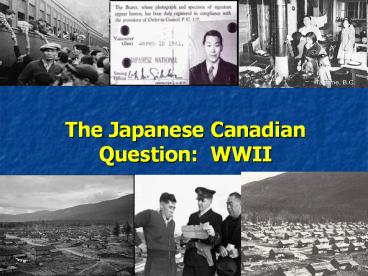The Japanese Canadian Question: WWII - PowerPoint PPT Presentation
1 / 29
Title: The Japanese Canadian Question: WWII
1
The Japanese Canadian Question WWII
2
Japanese Aggression
- Japanese expansion in East Asia began in 1931
with the invasion of Manchuria and continued in
1937 with a brutal attack on China. - On February 24th, 1933, Japan stuns the world and
withdraws from the League of Nations.
3
White Board
- Which American Holdings did the Japanese take in
the Pacific
4
JAPANESE AGRESSION Japan would occupying
Indonesia, parts of China, the Philippines,
Malaya, Burma, and Singapore, anti- Japanese
sentiments increasing
5
WHITE BOARD -What Nations were in the Central
Powers during WWI? -What Nations were in the Axis
Powers During WWII?
6
(No Transcript)
7
The Tripartite Pact
- On September 27, 1940, Japan signed the
Tripartite Pact with Germany and Italy, - Join "Axis."
8
Embargo Against Japan
- the United States, Britain and the Netherlands
froze all Japanese financial assets. - prevent Japan from purchasing oil
9
Discuss
- Come up with 2 ways this actions could devastate
Japan? - How could Japan get oil with out buying it from
foreign nations?
10
Canadian Sentiment
- 1939, British Columbia included around 21,000
Canadians of Japanese origin, 75 of whom had
residence rights. - belief was Japanese are unable to assimilate into
Canadian society as easily - Mackenzie King expressed the extreme difficulty
of assimilating Japanese persons in Canada
11
Japanese Bomb Pearl Harbour!
- December 7, 1941, President Roosevelt declares it
The Day of Infamy.
12
(No Transcript)
13
The Battle of Hong Kong
- Hong Kong surrendered on Christmas Day 1941.
- Of the 1,975 Canadians, 290 were killed and 493
wounded. - A further 260 died inPOW camps in Hong Kong and
Japan.
14
Loyalty of Japanese Canadians
- Japanese submarines are known to have been
operating off the coast of British Columbia - Canadian military evaluations suggested no
imminent threat by Japanese Canadians, - Many Canadians Feel no guarantee of the loyalty,
or passivity of Japanese-Canadians.
15
Discuss
- Why do you think Japanese were targeted at a much
higher rate than people of German background?
16
The Canadian War Measures Act
- 1914 gave the government sweeping powers to
ensure the security, defence, peace, order, and
welfare of Canada. - Used to imprison CANADIANS of German, Ukrainian,
and Slavic descent in WWI. - 1939- War Measures Act invoked- this allowed for
the internment of enemy aliens
17
What should be done?
- Resentment against Japanese Canadians exploded
into panic and anger in British Columbia. - 1,200 fishing boats were seized by the Canadian
navy in fear of spying
18
(No Transcript)
19
Japanese Internment in Canada
The movement of 23,000 Japanese Canadians
during the war was the largest mass exodus in
Canadian history.
20
Internment Timeline
- 1941 (December 8) 1,200 Japanese Canadian
fishing boats are impounded. Japanese language
newspapers and schools close. - 1942 (January 16) Removal begins of Japanese
immigrant males from coastal areas. - 1942 (February 24) All male Japanese Canadian
citizens between the ages of 18 and 45 ordered to
be removed from 100-mile-wide zone along the
coast of British Columbia. - 1942 (February 26) Mass evacuation of Japanese
Canadians begins. Some given only 24 hours
notice. Cars, cameras and radios confiscated for
protective measures. Curfew imposed. - 1942 (March 4) Japanese Canadians ordered to
turn over property and belongings to Custodian of
Enemy Alien Property as a protective measure
only. Eventually these assets were sold and
proceeds used to pay for the interment - 1942 (March 25) British Columbia Security
Commission initiates scheme of forcing men to
road camps and women and children to ghost town
detention camps.
21
Conditions in the Camps
- Housed in huts with two bedrooms and a kitchen
- shared by two families
- No electricity or running water until 1943
22
Camp Conditions continued
- Hundreds of women and children were squeezed into
livestock buildings - Slept on beds covered in straw for comfort
- Conditions were so poor that food packages were
sent from Japan through the Canadian Red Cross to
those suffering in the camps
23
White Board
- What other nations actions probably help justify
internment?
24
End of the War
- In 1945, the government extended the Order in
Council to force the Japanese Canadians to go to
Japan and lose their Canadian citizenship, or
move to eastern Canada. - Even though the war was over, it was illegal for
Japanese Canadians to return to Vancouver until
1949. - Public protest would eventually stop the
deportations, but not before 4000 Japanese left
the country.
25
Acknowledging Wartime Wrongs
- Forty-three years after the end of the war, Prime
minister Brian Mulroney acknowledged the wrong
doings of the Canadian government and announced
the awarding of 21,000 for each individual
directly wronged. - Is this an acceptable redress to the issue?
26
Watch
- Watch David Suzuki- Internment Camp (2
min)http//www.youtube.com/watch?vIMk_RRO5ZUw - Watch CBC News Apology to Japanese Canadians
(4 min) - http//www.youtube.com/watch?vfxVZtQULIMQfeature
related
27
TOWN HALL MEETING
- 1. Students will form groups of 5. Each person
will then be designated a letter (A, B, C, D or
E) which represents a specific profile. 2.
Students will read their designated profile and
then return to their group. - 3. There will be a town hall meeting (ie. Each
table) in which students will present their
profile and address the question Due to the
increasing suspicions of the Japanese Canadians
and following Canadas declaration of war on
Japan, what should be done with the Japanese
Canadians living in British Columbia?
28
Take a stand. what is more important
- National Security
- Individual Rights
keeping in mind that people make decisions based
on what they know at the time!
29
Activity
- In pairs, examine QUESTION 2 on the following
worksheet http//www.markville.ss.yrdsb.edu.on.ca
/history/history/debatingissues_ww2.html . With
your partner, identify which arguments are for
the Yes side and No side.































